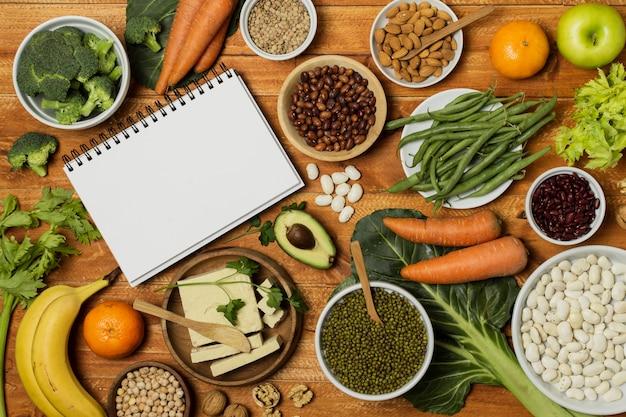
Thriving on a vegan diet requires intentionality. While plants offer a bounty of essential nutrients, certain vitamins and minerals can be more challenging to obtain solely from vegetables, fruits, legumes, and whole grains. This is where whole food supplements can step in, offering concentrated forms of nutrients naturally derived from food sources.
Supplementation should never be a substitute for a well-rounded diet. Consult your doctor before starting any new supplements, especially if you have pre-existing health conditions or take medications.
What are Whole Food Supplements?
Unlike traditional isolated vitamin and mineral pills, whole food supplements are derived from whole, unprocessed foods like fruits, vegetables, algae, and herbs. These raw materials are carefully processed using minimal heat and chemical intervention to preserve their natural nutrient profile, including vitamins, minerals, enzymes, antioxidants, and other beneficial plant compounds. This holistic approach aims to mimic the way your body naturally absorbs nutrients from food, potentially enhancing bioavailability and offering synergistic benefits.
Why Whole Food Supplements for Vegans?
Vegan diets, while rich in many nutrients, can sometimes fall short in specific areas. Essential nutrients like vitamin B12, iron, calcium, vitamin D, omega-3 fatty acids, and zinc require careful planning to ensure adequate intake. Whole food supplements offer a targeted way to address potential deficiencies, particularly for:
- Those with limited dietary variety: Busy lifestyles or restricted food choices might limit the diversity of plant foods consumed, potentially impacting nutrient intake.
- Individuals with specific needs: Pregnancy, breastfeeding, or underlying health conditions may increase certain nutrient requirements.
- People who struggle with absorption: Certain individuals have inherent difficulties absorbing specific nutrients from food sources.
Now, let's explore the Top 6 Whole Food Supplements for Vegans:
Why it matters: B12 plays a crucial role in energy production, nervous system function, and red blood cell formation. It's naturally found in animal products, making vegans highly susceptible to deficiency.
Whole food sources: Nutritional yeast, fortified plant milk, tempeh.
Supplement recommendation: Look for a high-quality vegan B12 supplement, ideally in methyl cobalamin or cyanocobalamin form. Consider consulting a doctor for dosage recommendations based on your individual needs.
- Omega-3 Fatty Acids:
Why they matter: Omega-3s, particularly EPA and DHA, support heart, brain, and eye health. While vegans can obtain ALA (plant-based omega-3) from chia seeds, walnuts, and flaxseed, converting it to EPA and DHA can be inefficient.
Whole food sources: Algae oil, walnuts, chia seeds.
Supplement recommendation: Choose a vegan omega-3 supplement derived from microalgae for optimal EPA and DHA content.
- Iron:
Why it matters: Iron facilitates oxygen transport throughout the body and is essential for energy production. Iron deficiency can lead to fatigue, weakness, and impaired immune function.
Whole food sources: Lentils, tofu, fortified cereals, leafy greens.
Supplement recommendation: Go for ferrous fumarate or ferrous gluconate for better absorption. Be mindful of potential interactions with other medications and avoid combining iron supplements with calcium-rich foods, coffee, or tea.
- Calcium:
Why it matters: Calcium builds strong bones and teeth, supports nerve and muscle function, and aids in blood clotting. While many plant-based foods contain calcium, absorption can be lower compared to dairy sources.
Whole food sources: Fortified plant milks, tofu, kale, collard greens.
Supplement recommendation: Choose calcium citrate or calcium malate for enhanced absorption. Consider combining your calcium supplement with vitamin D to further improve absorption.
- Vitamin D:
Why it matters: Vitamin D helps your body absorb calcium and phosphorus, crucial for bone health. It also supports immune function and muscle strength. Vegan diets rarely contain vitamin D, and sunlight exposure, the primary source, can be limited.
Whole food sources: Limited naturally, often added to fortified plant milks and cereals.
Supplement recommendation: Look for vitamin D3 supplements sourced from lichen or algae. Aim for 2000-4000 IU daily, depending on your individual needs and sun exposure.
- Probiotics:
Why they matter: Probiotics are live bacteria that promote gut health and overall well-being. They support digestion, nutrient absorption, immune function, and even mood regulation. Some vegan diets may lack the diversity of gut bacteria found in omnivorous diets.
Whole food sources: Fermented foods like sauerkraut, kimchi, tempeh, miso.
Supplement recommendation: Choose a high-quality probiotic supplement with multiple strains and at least 50 billion CFUs (colony forming units) per serving. Consider refrigerated formulas for optimal potency.
Living in Houston, you have the advantage of accessing reputable resources for whole food supplements. Explore local health food stores like Central Market or Wheatsville, known for their commitment to organic and natural products. Consider consulting with health practitioners at clinics like Holistic Houston Doctors who specialize in integrative and functional medicine for personalized guidance on selecting whole food supplements in Houston that align with your unique needs.
Whole food supplements are not magic bullets. Prioritize well-rounded, balanced vegan diet rich in fruits, vegetables, whole grains, legumes, nuts, and seeds.
Supplements can fill nutrient gaps but shouldn't replace the health benefits of whole foods.
Consult your doctor before starting any new supplements, especially if you have pre-existing health conditions or take medications.
By strategically incorporating whole food supplements into your vegan lifestyle, you can empower your body and mind to thrive on the power of plants. Embrace this journey with informed choices and enjoy the vibrant health that awaits!
